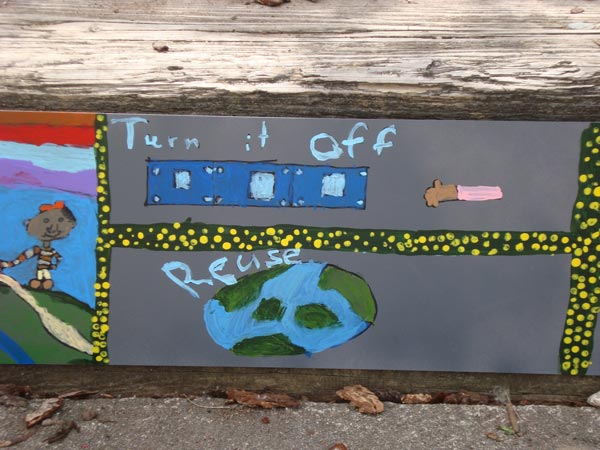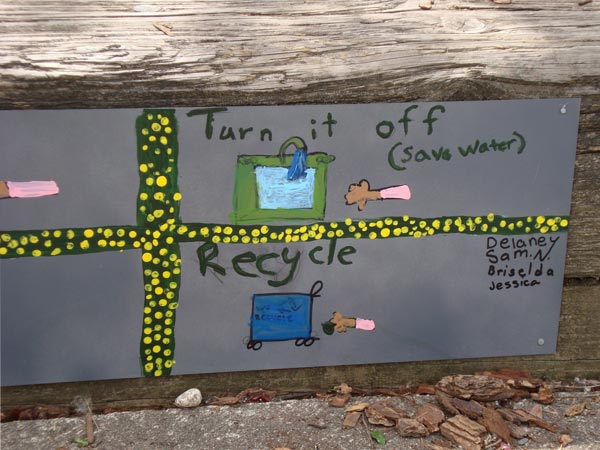Success story: Martin Sortun Elementary School
School District: Kent
School Location: Kent
Began participating in the Green Schools Program: May 2008
Level One of the Green Schools Program: Achieved in June 2009
Level Two of the Green Schools Program: Achieved in June 2010
Level Three of the Green Schools Program: Achieved in May 2011
Waste reduction and recycling
- Martin Sortun Elementary School increased its recycling rate from 20 percent to 57 percent and cut garbage volume by 50 percent by increasing classroom recycling and starting to recycle at lunchtime.
- The student green team, led by education assistant Scott Meyer, promoted recycling through posters, morning school-wide announcements, and a year-long lunchroom monitoring system.
- The new cafeteria avoided the use of polystyrene trays by bringing food to each table on large metal trays.
- Recycling containers were placed in the lunchroom for milk cartons, juice boxes, plastic bottles and aluminum cans.
- School staff placed recycling stickers listing what can and can’t be recycled on classroom and lunchroom recycling containers.
- In 2010-11, the school created a “Going Green” how-to book, which includes tips from A to Z. For example, “A” stands for “Awareness: be aware of what you buy and use.”
Energy conservation


- Through a campaign called “the power is in your hands,” students created “lights off” stickers and posted them by switches school-wide. The students encouraged fellow students to recognize that their individual actions make a difference.
- To save energy and heat, after-hours activities are centralized into common areas.
- Windows and doors are closed to save energy. Blinds are open when appropriate to promote natural light and save energy.
- The Kent School District created custodial and staff holiday energy conservation checklists.
- The school participated in the Cool Schools Challenge, http://www.coolschoolchallenge.org/about-us.aspx, a program of the Puget Sound Clean Air Agency that aims to motivate schools to reduce greenhouse gas emissions school-wide.
Water conservation
- Students participated in a school-wide campaign to turn off water faucets when not in use and to report leaking toilets.
- Students developed an awareness of the need to keep our fresh water clean and free from pollutants. Students and teachers were encouraged to help each other remember to turn off the water when not in use and to avoid pouring polluted materials down the drain.
- Students learned about watersheds and the water cycle through field trips and outdoor education.
- Students created posters to place around the school that communicated the importance of water conservation.
- Martin Sortun recognized students and classrooms who were modeling water conservation at monthly assemblies. Students earned individual recognition as the Green Individual of the Month and classrooms earned a Green Class award for conservation behaviors.
Environmental education
- Kindergarten students explore the world of marine life, and learn about animals that live in the ocean and how they depend on clean water and habitat.
- First grade students explore the life cycle of insects, and learn how all insects play a role in our ecosystem.
- Second grade students study how humans interact with and depend on plant resources.
- Third graders study the water cycle, the role of pollution, and actions they can take to protect water resources.
- Fourth grade teachers and students developed a native plant garden at the school entrance, learning how native plants sustain habitat and reduce water consumption. They decorated raised beds with conservation images and slogans.
- Fifth graders study erosion and how the preservation of forests helps to reduce erosion and support the health of our ecosystem.
- Leaders in the sixth grade educate and lead green teams.
- Individual and classroom green awards are handed out monthly.
- The classroom with the best green practices in a given month wins a native plant to display.
- Martin Sortun established a student Green Club to promote conservation practices. The club was so popular that more than 80 students showed up for the first meeting, and the staff advisors narrowed the group through an application process. Students in the club monitor lunchroom recycling, mentor younger students, develop new ideas and lead conservation campaigns.
Awards
- The Martin Sortun green team received a King County Earth Hero at School award in April 2010.
Comment
“So the coolest thing just happened. I was sitting in my office which is next to the library. Two kids walked by and stopped at the recycling and trash bins and I overheard one say, ‘Dude! Why is there so much recycling in the garbage?’ Conservation is becoming part of the culture at our school, with buy-in from students and staff.”
– Scott Meyer, Educational Assistant
For more information about the school’s conservation achievements and participation in the Green Schools Program, contact:
Scott Meyer, education assistant
scott.meyer@kent.k12.wa.us


 Translate
Translate
